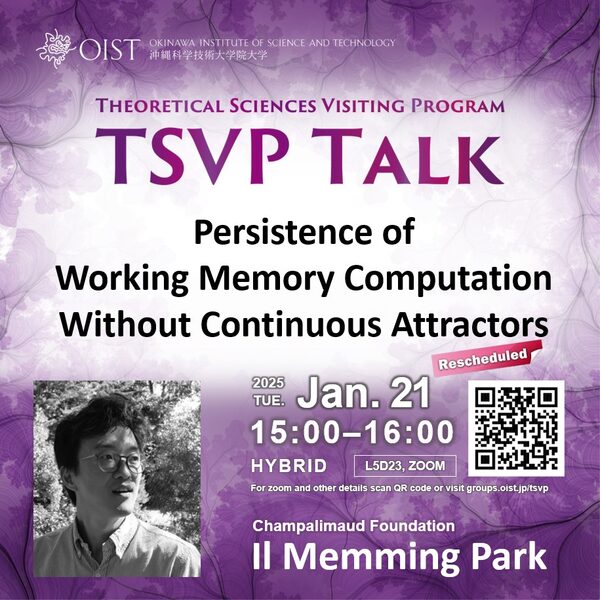TSVP Talk: "Persistence of Working Memory Computation Without Continuous Attractors" by Il Memming Park

Description
Title: Persistence of Working Memory Computation Without Continuous Attractors
Abstract: Neural systems with dynamical structures, such as point and continuous attractors, are thought to support the temporal behaviors that require working memory. We demonstrate that, beyond the traditionally studied continuous attractors—which are brittle under D-type perturbations—periodic and quasi-periodic attractors can sustain learning over arbitrarily long temporal relationships. Although quasi-periodic attractors show promise for learning and memory without structural instabilities, they present challenges in physical implementation due to requirements for exact replication. Revisiting continuous attractors, we find that their structural instability is actually less problematic over shorter timescales. Our analysis reveals that the manifold supporting analog memory degrades gradually, leaving a slow manifold with bounded error that approximates continuous attractor behavior. Thus, we can consider continuous attractors as a useful ideal while interpreting the real-world systems as practical approximations.
Profile: Il Memming Park (박일, 朴逸) is a Group Leader of the Neural Dynamics (CATNIP) lab at the Champalimaud Centre for the Unknown. He was a tenured Associate Professor at Stony Brook University (2015-2023). He received his B.S. in computer science from KAIST, M.S. in electrical engineering and Ph.D. in biomedical engineering from the University of Florida (2010), and trained with Jonathan Pillow at University of Texas at Austin as a postdoctoral fellow (2010-2014). His research goal is to understand how information is represented and computations are implemented in artificial and biological neural systems over multiple time scales. He designs interpretable statistical models and machine learning methods specialized for neural signal processing. Personal website
Language: English
Target audience: General audience/everyone at OIST and beyond.
Freely accessible to all OIST members and guests without registration.
This talk will also be broadcast online via Zoom:
Meeting ID: 975 3409 2303
Passcode: 127353
※ Please note that this event may be recorded and the videos uploaded. In addition, photos may be taken during the event. These are intended for publication online (the OIST website, social media, etc.)※
Add Event to My Calendar
Subscribe to the OIST Calendar
See OIST events in your calendar app





